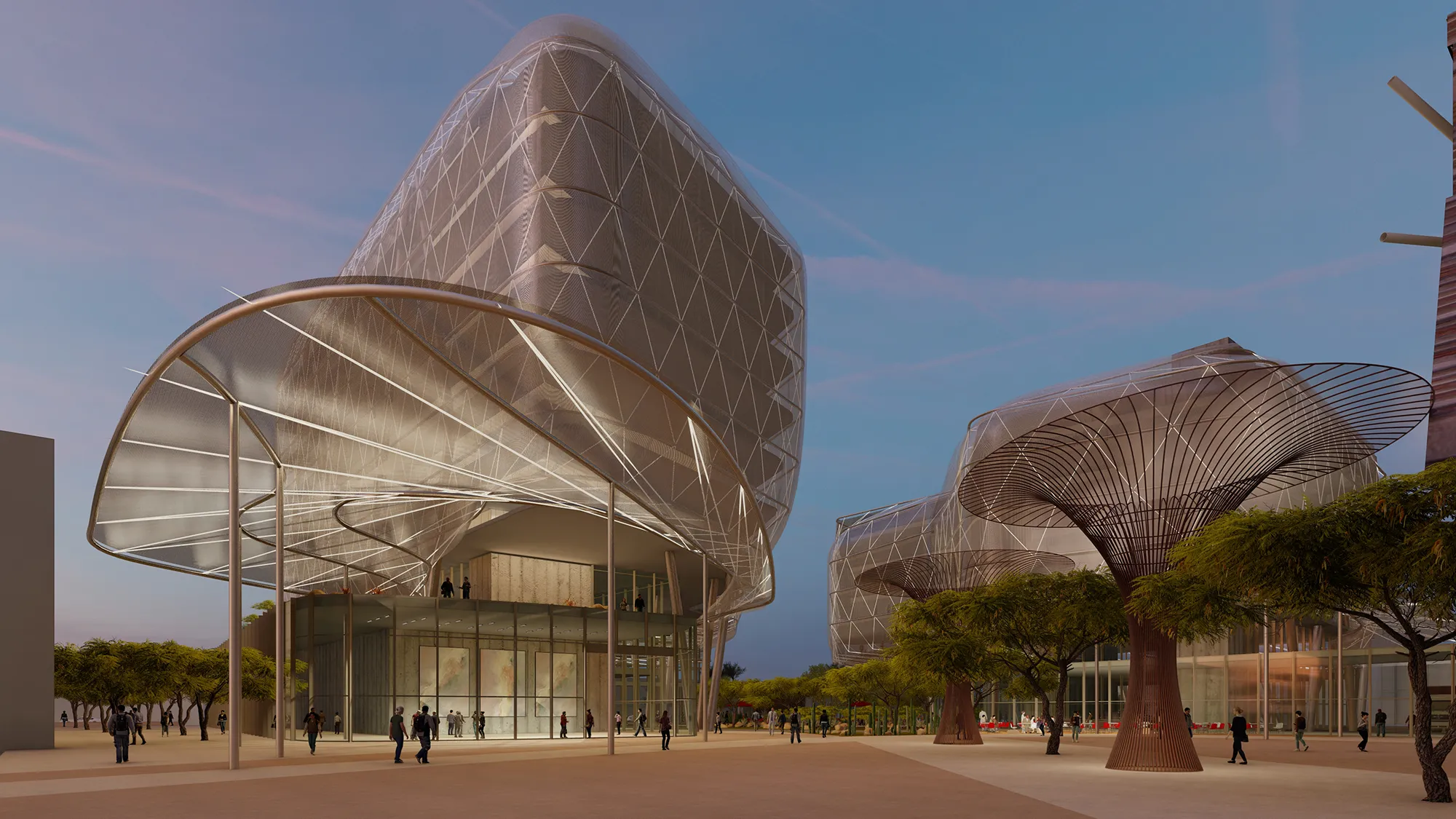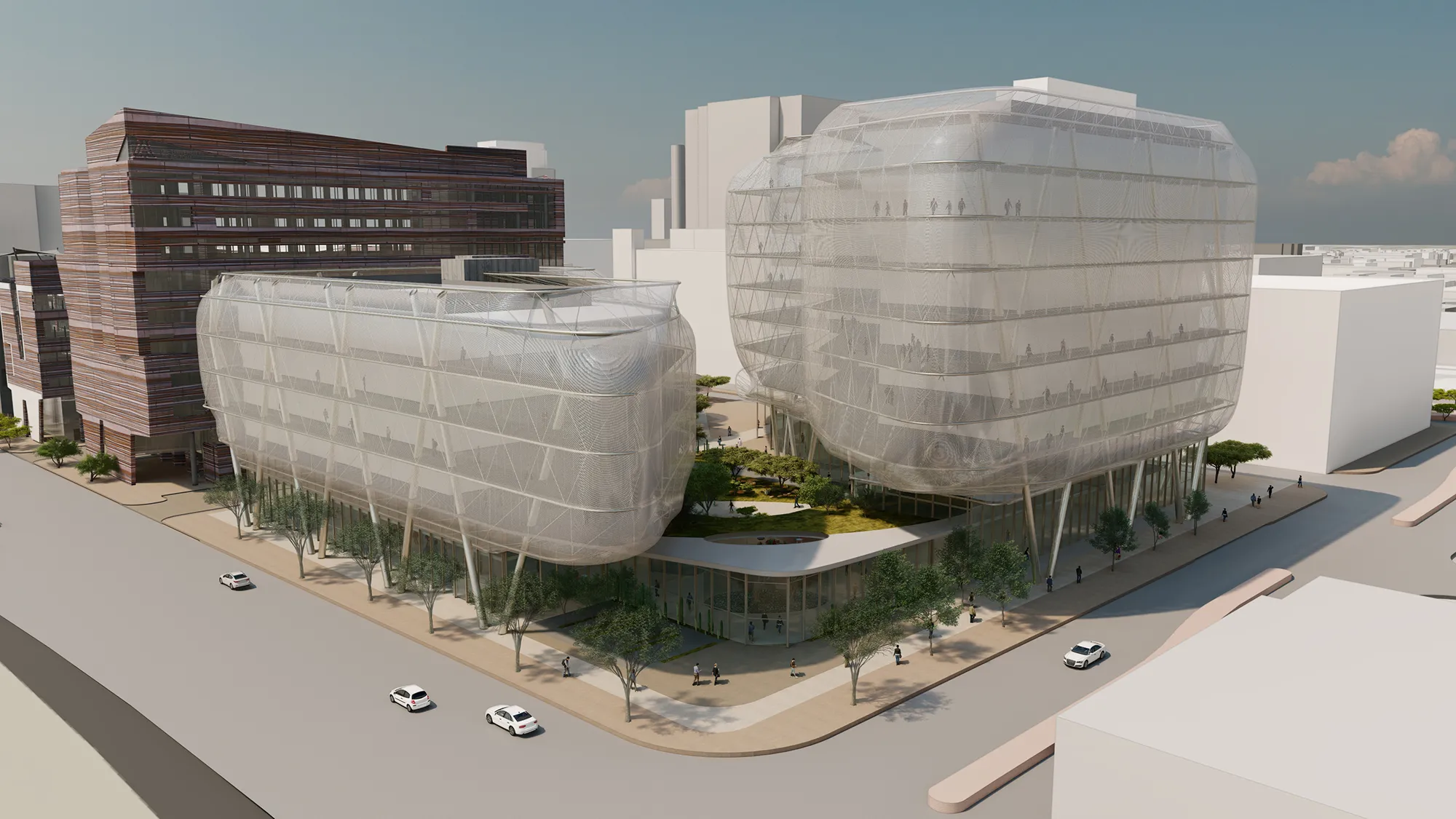Tomorrow is Here
Sparked by $150 million in state funding, the Center for Advanced Molecular and Immunological Therapies will support research to catalyze the next generation of precision health care treatments.

The Center for Advanced Molecular and Immunological Therapies, or CAMI, will advance knowledge of the immunology of cancers, infectious diseases and autoimmune conditions.
/ CO Architects rendering
When she was in her 30s, Molly Cassidy was handed a death sentence. Traditional treatments failed to fight the aggressive head and neck cancer that was running rampant through her body. Doctors were out of options, until a clinical trial at University of Arizona Health Sciences offered a glimmer of hope and, eventually, a second chance at life thanks to immunotherapy.
Immunotherapy is a treatment that uses a person’s own immune system to fight cancer. In Cassidy’s case, she received a personalized cancer vaccine in combination with an immunotherapy drug that helps the immune system fight certain kinds of cancer — and it worked. A year after the UArizona Cancer Center clinical trial ended, there were no traces of cancer left in her body.

Molly Cassidy
/ UArizona Health Sciences photo
Researchers and physician-scientists are increasingly using precision medicine to develop new cell- and gene-based therapeutical options for diseases, building on the idea that the most effective defense against health issues is the body’s own immune system. Immunotherapy is one type of precision medicine; another is molecular therapy, in which drugs and other substances target specific molecules involved in disease progression.
At UArizona Health Sciences, the Center for Advanced Molecular and Immunological Therapies, or CAMI, is being developed to advance knowledge of the immunology of cancers, infectious diseases and autoimmune conditions to develop novel strategies for diagnosis, prevention and treatment.
CAMI will be housed at the Phoenix Bioscience Core — a downtown Phoenix initiative that also is home to the UArizona College of Medicine – Phoenix. It will include space for academic and research activities as well as collaboration spaces to serve academic, research and community needs.
Changing the way doctors treat disease
Immunotherapy is one of the most promising approaches to cancer treatment, as it has the potential to sidestep the effects of other therapies that can compromise patients’ long-term health and wellness. But cancer isn’t the only target researchers, including bioengineer Michael Kuhns, have in their sights.
“Bioengineers solve fundamental problems with technologies that can have many applications,” says Kuhns, associate professor in the UArizona College of Medicine – Tucson and member of the BIO5 Institute. “If you can make something run more efficiently in certain circumstances — for example, make T-cells in the immune system more effective at combating a particular disease — then the only limit to immunotherapy is your imagination.”
Kuhns’ research in the Department of Immunobiology focuses on engineering chimeric antigen receptors, or CARs, a relatively new type of gene therapy. He built a biomimetic five-module chimeric antigen receptor, or 5MCAR, to direct killer T-cells to target and destroy autoimmune T-cells. When tested in an animal model, the 5MCAR T-cells recognized and destroyed pathogenic T-cells, effectively preventing Type 1 diabetes.
CAMI will focus on developing precision therapies that stimulate or suppress the immune system to fight diseases including cancers, infectious diseases and autoimmune conditions.
“This technology has clear implications for autoimmune disease, but also for cancer,” says Kuhns, who serves on the 21-member CAMI Advisory Council. “This technology emerged from basic science, is taking hold in the laboratory, and is showing promise to go to the clinic. This is a prime example of what we can do.”
Other examples of potential research include identifying biomarkers for response to immunotherapy that may help determine the precise drugs to fight specific cancers in individual patients; understanding individual immune responses to autoimmune diseases such as lupus, rheumatoid arthritis and Crohn’s disease; and creating ways to analyze immune health at the cellular level to identify how individuals might respond to a disease and to predict their health outcomes.

/ CO Architects rendering
Creating a biosciences innovation hub in Phoenix
CAMI will serve as the anchor for an innovation district that aims to differentiate Phoenix from other emerging life sciences hubs by establishing the Phoenix Bioscience Core as a center for cell and gene therapy research, startup activity and corporate engagement. Its location is expected to facilitate strong connections with partners like Arizona State University, Northern Arizona University, the Mayo Clinic and the Translational Genomics Research Institute, among others.
“We expect CAMI to be nothing short of a national biomedical research hub,” says Michael D. Dake, senior vice president for UArizona Health Sciences. “CAMI will be a beacon for people who are involved in this type of research to work, collaborate and engage on the Phoenix Bioscience Core.”
The research will take place in connected buildings that will include laboratories to support translational research, clinical research space and startup incubator space to create a synergistic environment for commercialization opportunities. Student education will be prioritized in learning spaces dedicated to academic programs that will allow CAMI faculty and researchers to mentor and train the next generation of scientists.
“There is not a field with more explosive growth than immunotherapy. There is rapid growth in research investment and increased formation of academic and industry partnerships around the world,” Dake said during a Tomorrow is Here Lecture Series presentation in Phoenix. “My hopes are that CAMI is going to provide opportunities to accelerate the development and delivery of revolutionary treatments for the management of cancer [and] autoimmune and infectious diseases.
“We are going to see diversification of drug classes and different types of combination therapies, delivery mechanisms and monitoring,” he added. “Going forward, I think we’re going to see a wide array of therapies that are going to be vastly different than any past generations ever had. Suffice it to say, in the future, pills and syringes are going to be obsolete.”
UArizona Health Sciences center receives $150M state investment
The University of Arizona Health Sciences Center for Advanced Molecular and Immunological Therapies, or CAMI, received a vote of support from former Arizona Gov. Doug Ducey, who designated $150 million in new funding for the Phoenix-based center. CAMI, to be constructed at the Phoenix Bioscience Core in downtown Phoenix, will advance lifesaving research into precision medicine, a rapidly growing field within health care promoting individualized cell- and gene-based treatments for cancer as well as infectious and autoimmune diseases.
CAMI also is expected to draw an estimated 150 companies to the Phoenix area over the next decade, generating more than 20,000 jobs and boosting economic activity in Arizona by at least $3.9 billion.
“It is not often that an opportunity to benefit Arizonans in such diverse ways presents itself, as it has with CAMI,” Ducey said. “As it grows, CAMI is poised to bring new jobs and businesses to Arizona, bolstering the economy not only in Maricopa County but also across the state. More importantly, the research CAMI will advance and bring to fruition offers Arizona residents the hope of new treatments that will positively impact their health and well-being. My thanks to President Robbins and the University of Arizona for their dedication to building a healthier Arizona.”
